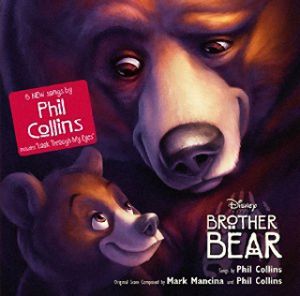Brother Bear
Music composed by Mark Mancina & Phil Collins
Songs by Phil Collins
Available on Walt Disney Records 60127-7
Running time: 48.48
Amazon UK Amazon US

Apart from the computer-assisted imagery, the greatest assets of Disney's Tarzan were its score by Mark Mancina and the songs by hit-maker Phil Collins. Reuniting for Disney's Brother Bear, Collins writes the songs and debuts as a film-score composer, sharing responsibilities with Mr. Mancina. The result is an arguably more fluid, more engaging album.
With an edgy nasal voice one could theoretically use to clean ovens, Collins' popular appeal may not extend to many aficionados of orchestral film scores, but it sets him apart from the slick (though rarely more accomplished) clones that clutter the pop charts. Most importantly, it suits his songs, which tend to have pleasantly familiar melodies and lyrics that vary from poetic to being little more than self-help pamphlets with rhymes.
Central to the animated tale is the concept of seeing the world through another's eyes, a frequent theme in Collins' work, and so his opening track, 'Look Through My Eyes' (no need for subtlety here), is a predictable pop confection that makes that message loud and clear. Part story, part prayer, 'Great Spirits' features 'rock diva' Tina Turner setting the story of 'three brothers, bonded by love'. I doubt you will hear this at any of her future concerts.
When Collins goes into a cheerful mode, the faults tend to slip away, and the celebratory 'Welcome' is evidence, later reprised with the gospel group The Blind Boys of Alabama. 'No Way Out', the main theme included here in single and film versions, fits into the poetic category, speaking of missed opportunities, shame, sorrow, and redemption. Collins also goes for a folksy traveling tune, 'On My Way'; I find this delightfully catchy. The highlight, however, is the 'Transformation' cue for a Inuit sibling's metamorphosis into a bear - The Bulgarian Women's Choir providing a distinctive, genuinely powerful choral performance to one of Collins' best themes; the songwriter's solo version, as good as it is, may draw some benefit from the listener's recollection of the earlier setting.
Approximately 19 minutes of underscore divided amongst three tracks is not much, but Mancina and Collins use the song melodies judiciously, allowing fresh orchestral colours and down-to-earth new themes to breathe into a warm, simple score that a pleasure to hear. The music is airy, with lean but nevertheless effective action cues, and an assortment of percussive and vocal touches that, unlike the songs, bother to clearly establish the North American setting. One could argue that the score sounds shallower than Mancina' previous scores, including Tarzan, but the goals here are simpler, the distribution of ideas more even-handed, and it better recognises the songs by Collins (who's never quite been a model of highbrow musical sophistication), making the whole more successful, not less. It is a streamlined effort that remains entertaining.
Of course, those who can't stand Phil Collins would undoubtedly do well to stay away from Brother Bear. Others may view this collaboration between Collins and Mark Mancina as a winning addition to their respective careers.
Jeffrey Wheeler
3
Return to Index